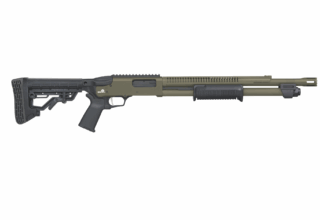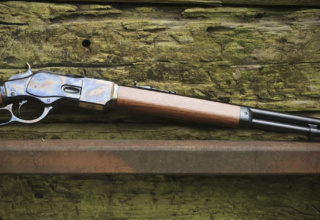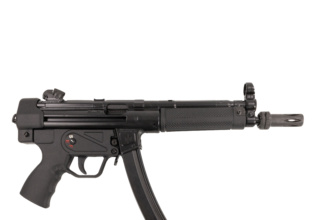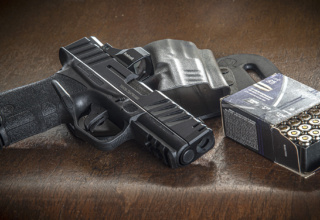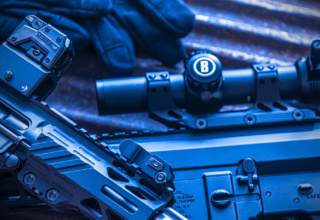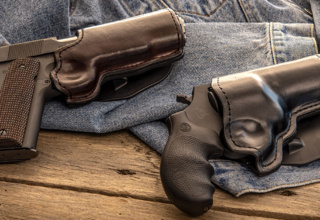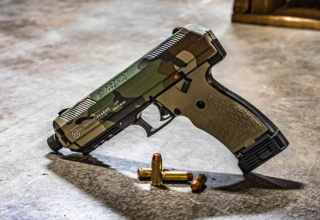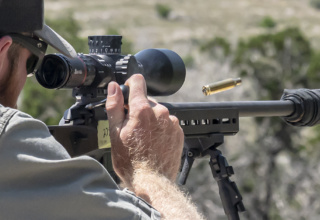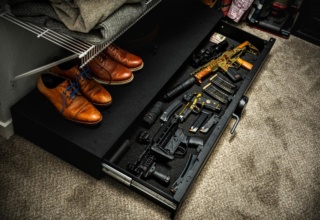Unless you’ve been living in a cave for the last decade or so, you’ve probably heard something about the .450 Bushmaster. Perhaps you’ve come across the cartridge at your local gun shop or saw an online review of an AR-platform rifle so-chambered. If you are a typical whitetail hunter, chances are you never gave the .450 Bushmaster more than a passing glance, thinking it to be yet another fringe-caliber cartridge that didn’t apply to your particular style of hunting or shooting.
It’s understandable. With the hunting world’s focus never far from cartridges and rifle platforms designed for long-range accuracy and sophisticated terminal performance, the idea of adopting an admittedly slower, closer-range cartridge for big-game hunting sort of runs counter to the conventional buzz—unless busting wild hogs at spitting distance is more your thing. Thus, you’ve likely never given the .450 Bushmaster the consideration it deserves, let alone explored the possibilities of what it might offer you in the whitetail woods.
That is changing for a lot of deer hunters, and here’s why…
The impetus for the .450 Bushmaster was actually a call-to-arms, so to speak, for a more effective, one-shot-and-done defense cartridge. The late and often controversial Col. Jeff Cooper—champion of big-bore knockdown power in both rifles and handguns—had long held that the U.S. military’s adoption of the 5.56 NATO cartridge was a mistake. He argued (as did many frontline soldiers) that the diminutive round was insufficient for getting the job done quickly in battle conditions. Cooper, always a fan of the .45 ACP pistol cartridge, envisioned a similar-sized pill designed for a carbine—something that would put the bad guy down with decisive, one-shot finality. Being a hunter as well as a tactical trainer and theorist, Cooper also acknowledged the benefits of such a round for big-game applications. Not cape buffalo or brown bear, perhaps, but certainly a score-settler for any of North America’s Cervidae family as well as hogs and black bear.

Ruger’s Scout Rifle in .450 Bushmaster brings together the concept championed by Col. Jeff Copper of a hard-hitting carbine suitable for the broadest defense and hunting applications. [photo by Ruger]
Without going into a deep sidebar history lesson, the short story is that a gentleman named Tim LeGendre from LeMag Firearms brought Cooper’s theoretical cartridge to life for use in the AR-15 and licensed it to firearm manufacturer Bushmaster. Bushmaster then turned to Hornady to produce a viable commercial cartridge based on LeGendre’s design. To that end, Hornady selected their 250-grain, .454-inch SST Flex-Tip bullet and shortened Legendre’s original “.45 Professional” cartridge case to 1.700 inches and the .450 Bushmaster was born.
From the outset, the .450 Bushmaster was an oddity in the Modern Sporting Rifle arena. Designed to be compatible with the AR platform and chamber via a standard-sized AR magazine with a single-feed follower, the rifle gained an esoteric following among some AR fans and MSR hunters who realized the cartridge’s potential for battling feral swine in the brush and swamps.

Numerous ammo manufacturers have stepped into the .450 Bushmaster realm, delivering straight-wall cartridges with bullets designed for get-it-done terminal performance on big-game animals. A good example is Remington’s Premier AccuTip 450 Bushmaster. [photo by Remington]
It was in the AR world that the .450 Bushmaster orbited for almost a decade after Hornady introduced the cartridge and Bushmaster Firearms delivered the platform to launch it. Several firearm manufactures offered their own variants, but only recently has the .450 Bushmaster cartridge walked into the crosshairs of the mainstream hunting arena.
As many hunters in several Midwest states know, only in the last few years has legislation loosened with regards to restrictions on centerfire rifles. Heretofore, some states have prohibited the use of “high-power” centerfire rifles that use necked cartridge cases, effectively limiting hunters to shotguns, muzzleloaders, and pistols during the traditional firearm seasons. This was because state officials deemed the higher-velocity bottleneck cartridges to be potentially hazardous for use in areas with relatively flat ground, high hunter numbers, and denser populations.

Rock River Arms is one of several AR manufacturers producing rifles or upper receiver assemblies chambered in .450 Bushmaster. This is the RRA LAR-15M. [photo by Rock River Arms]
Around 2007, Indiana took the first step toward providing hunters a centerfire rifle alternative by opening select cartridges for the deer rifle season. Other states eventually looked at allowing straight-wall (pistol) cartridges for use in rifles. In 2014, Michigan legislated the use of straight-wall cartridges (minimum and maximum case lengths of 1.16 to 1.80, respectively) with .35 caliber or larger bullets in the state’s Limited Firearms Deer Zone, and that was the tipping point for the .450 Bushmaster to begin its mainstream ascension.
Seeing an opportunity, Ruger chambered its American Rifle in .450 Bushmaster, releasing it in late 2016, and worked with Gunsite Academy, founded by Col. Cooper, to develop Cooper’s envisioned “scout rifle” in .450 Bushmaster. The result was the Ruger Gunsite Scout Rifle, the ultimate merging of Col. Cooper’s do-it-all defense/hunting rifle and his notion of a hard-hitting, one-shot-and-done cartridge.

The Savage Arms Scout is another bolt-action carbine chambered in .450 Bushmaster. [photo by Savage Arms]
Deer hunters in Michigan welcomed the new Ruger rifles, and now more states with similar cartridge restrictions as Michigan have begun allowing straight-wall cartridges that fall within the parameters of the .450 Bushmaster.
Veteran shooters may be asking, and rightly so, why the hype on the .450 Bushmaster when rifles chambered to shoot pistol cartridges have been around forever? The answer is simple ballistics. No one would argue the prowess of the .44 Remington Magnum or .454 Casull for big game encounters, but their shorter case lengths (1.285- and 1.383-inch, respectively) and reduced charge relative to the .450 Bushmaster gives the latter the decided edge in a rifle platform.
Consider, for example, Hornady’s 450 Bushmaster 250 gr. FTX ammo. As shot from a 20-inch barrel, velocity is an envious 2200 fps at the muzzle and it’s still going strong at 1524 fps at 200 yards. As for energy, Hornady’s round delivers 1879 ft/lbs at the muzzle and 1289 ft/lbs at 200 yards.
Trajectory for the inside-200-yard window is also spot-on for the typical whitetail hunter. Using Hornady’s ballistic data, their .450 Bushmaster exhibits -2″ at the muzzle, 2.5″ at 100 yards, and -3.4″ at 200 yards. That’s less than a six-inch variance and a comfortable deviation for sacking a big buck with precision and authority.

Federal Premium offers the .450 Bushmaster Power Shok in 300-grain jacketed hollow point. [photo by Federal Premium]
For hunters looking to put their MSR to task on North American big game, the .450 Bushmaster is ready to play. The Bushmaster 450 carbine is an excellent choice, as is the new LAR-15M .450 Bushmaster from Rock River Arms.
Still, bolt-action carbines continue to hold the base for whitetail hunters, and with the growing number of states making room for straight-wall centerfire cartridges in this caliber, more rifle manufacturers are getting onboard.
We already mentioned Ruger’s American Rifle (Ranch and Go Wild Camo) models in .450 Bushmaster, as well as a couple of their Scout Rifles. You can now add to that list the Savage 110 Scout bolt-action, with its 10-round capacity and short 16.5-inch barrel, and the 110 Wolverine, featuring an 18-inch barrel and 5-round mag.
What has intrigued us more, though, are the single-action rifles now being offered by well-known muzzleloader manufacturers CVA and Traditions Firearms.
Why single-action? A couple of reasons.
For starters, single-action rifles change the hunting game, adding a touch more spice to the hunt just as muzzleloaders or single- and double-barrel shotguns do. The “reset time” of a single-action rifle tends to focus the hunter in a way that rapid-follow-up bolt-action, pump, or semi-autos often don’t. It adds a challenge to the hunt which many sportsmen enjoy once they take the plunge.

CVA Scout .450 Bushmaster (top) and Traditions Firearms Outfitter G2 (bottom)—two single-shot entries in the .450 Bushmaster game that are quickly gaining a following with hunters looking for something new and affordable.
Another reason is that single-shots, such as CVA’s Scout .450 Bushmaster or Traditions’ Outfitter G2, have MSRPs just a hair over $400. This places them in the disposable income range for hunters looking to add to the fun factor and they are an easy investment for young hunters.

And this brings us to why we thought a broader discussion of the .450 Bushmaster was in order. Yes, the cartridge delivers the accuracy and devastating knock-down power for deer hunters in restricted firearm states and zones, but it also has appeal for any big-game hunter who desires the same. With a solid 200-yard capability and unrivaled performance in brushy, close-quarter environments, the .450 Bushmaster—whether propelled by an AR-platform rifle, bolt-action, or a single-shot—will “lights out” most big game critters quite handily and provide a whole lot of fun in the process.


